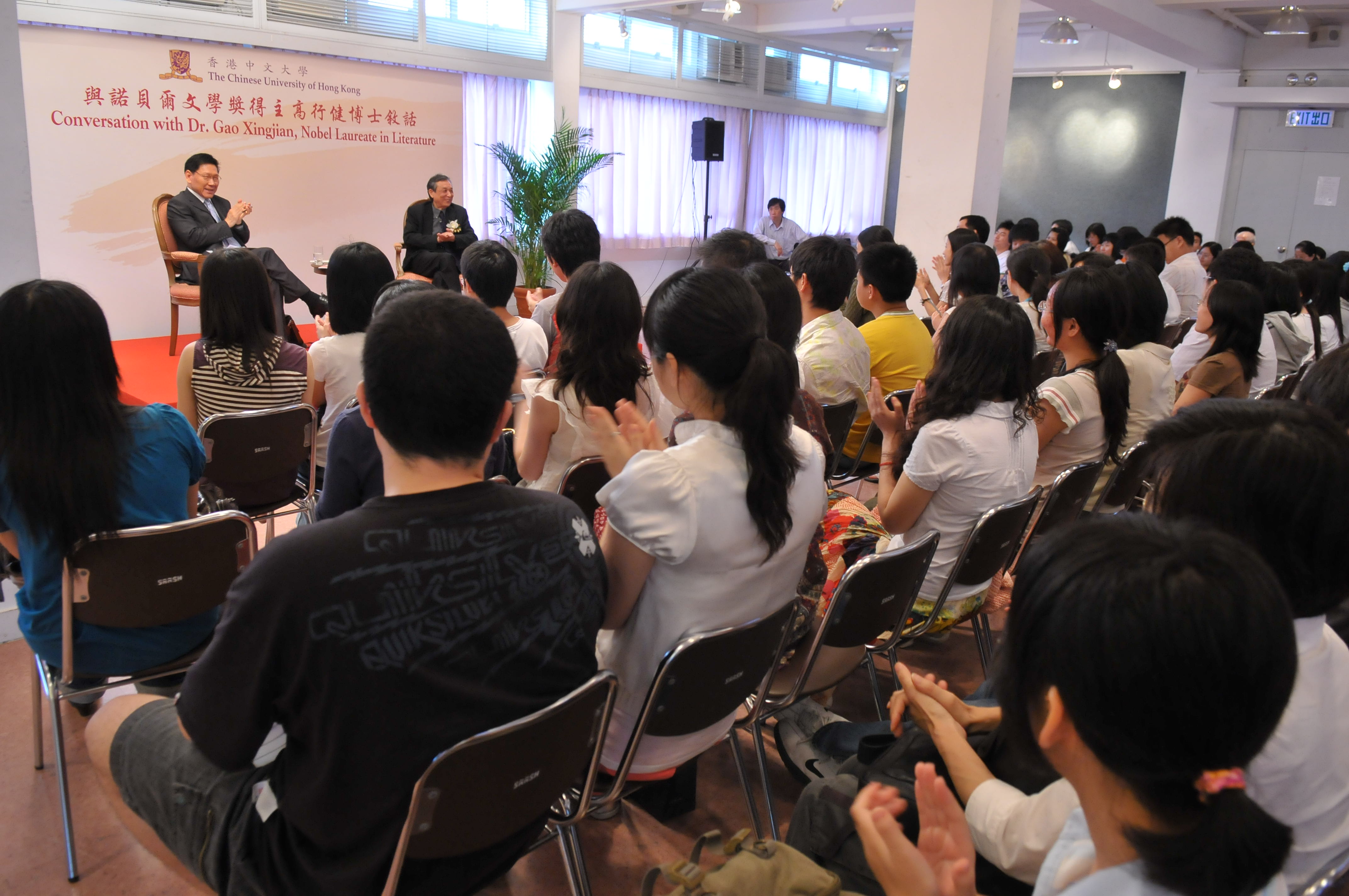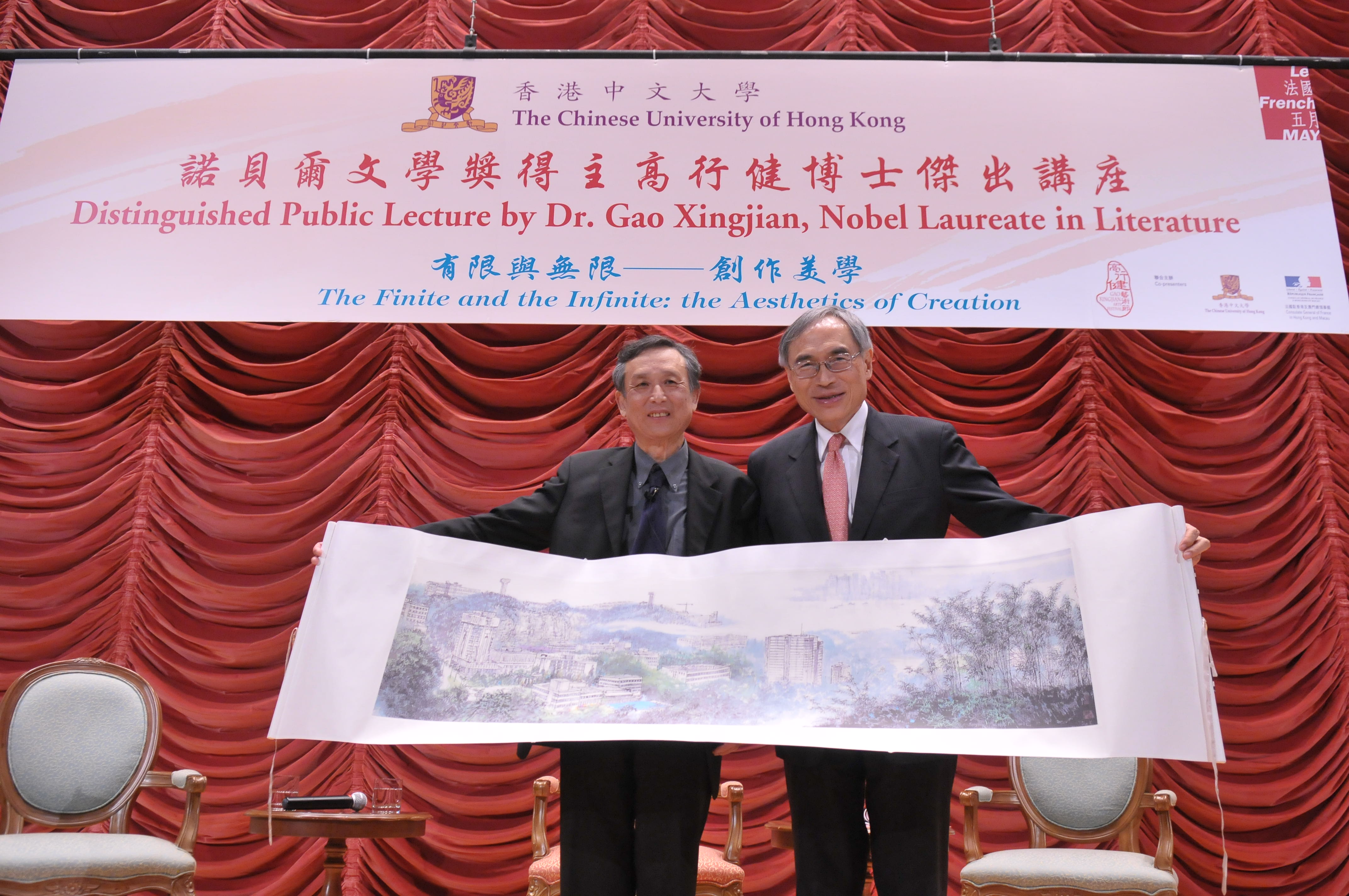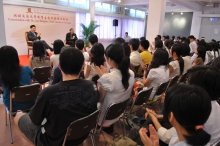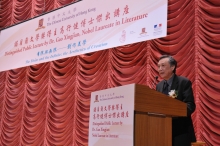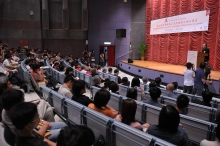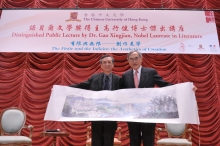News Centre
Nobel Literature Laureate Gao Xingjian Speaks on Infinite Freedom of Expression within Limitations at CUHK
The first Chinese Nobel laureate in Literature, Dr. Gao Xingjian, presented the “Distinguished Public Lecture by Dr. Gao Xingjian, Nobel Laureate in Literature” at the Shaw College Lecture Theatre, CUHK today (23 May). This public lecture is one of the highlights of the “Gao Xingjian Arts Festival”, the first major retrospective of the works of the renowned Nobel Prize laureate Dr. Gao Xingjian in Hong Kong. The Festival is co-presented by CUHK and the Consulate General of France in Hong Kong and Macau as one of the events of Le French May, and organized by the Hong Kong Drama Programme of Sir Run Run Shaw Hall, CUHK.
Speaking at the lecture, CUHK Vice-Chancellor Professor Lawrence J. Lau expressed his gratitude to Dr. Gao, Mr Christian Ramage, Deputy Consul General of France in Hong Kong and Macau, and other parties for their support of the “Gao Xingjian Arts Festival”. He remarked, “Dr. Gao’s long acquaintance with CUHK can date back to October 1993 when he first visited Hong Kong and delivered the first Sin Wai Kin Lecture on Contemporary Chinese Culture at the invitation of the Institute of Chinese Studies of CUHK. He then visited CUHK again and took part in the International Symposium on Contemporary Play-writing in the Chinese Language. Dr. Gao was conferred the degree of Doctor of Literature, honoris causa in 2001 and became a CUHK alumnus. The world’s first Gao Xingjian Repository was established at the University Library in 2004. Over the years, Dr. Gao has keenly supported the art and research work at CUHK. His achievements in art and literature have been the topics of research by many CUHK staff and students.”
In the lecture titled “The Finite and the Infinite: the Aesthetics of Creation”, Dr. Gao shared his approach to creation and how to explore the infinite freedom of expression within limitations with nearly 500 CUHK staff and students, and members from the cultural community. Every form of art is confined to a finite set of limitations, i.e., the key features that characterize its nature, for example, literature to languages, fiction to narrative, drama to actors’ performance, and painting to the two-dimensional representation of objects. In determining his or her own approach to creation, an artist must first acknowledge these limitations before exploring the infinite freedom of expression within them. To provide Hong Kong people a chance to benefit from the insight of Dr. Gao, the lecture was broadcast live to local universities, CUTW Community College, and Hong Kong Science and Technology Parks.
Dr. Gao also shared his experience and insight on the creation of literature and art with some 100 students before the lecture.
Dr. Gao is a celebrated novelist, dramatist, literary critic, poet, painter, and stage and film director. He is an exceptionally versatile artist of multiple talents. Born in Ganzhou, Jiangxi Province, China, in 1940, he graduated from the Department of French of Beijing Foreign Studies University in 1962. His works were first published in 1980, and since then he has been considered a pioneer in Chinese experimental theatre and contemporary fiction. His works were a great sensation, but they were also strongly criticized and eventually banned in mainland China. His play Escape, published in the wake of the Tiananmen Square protests in 1989, led to a total ban of his works in mainland China. He subsequently settled in France as a political refugee.
In 1992, Dr. Gao was awarded the Chevalier de l’Ordre des Arts et des Lettres. In 2000, he received the Nobel Prize in Literature and Italy’s Premio Letterario Feronia, and was named Chevalier de l’Ordre de la Légion d’Honneur by the president of the Republic of France. The French city of Marseilles designated 2003 as “l’Anné Gao Xingjian” (Gao Xingjian Year) with year-round activities in honour of the artist. In 2006, Dr. Gao was awarded the Lions Award by the New York Public Library. He was also conferred honorary doctorates by the Chinese University, l’Université de Provence in France, and Taiwan University, Central University and Sun Yet-sen University in Taiwan.
Dr. Gao’s major works include novels Soul Mountain and One Man’s Bible, short stories, theoretical works on art and literature, as well as plays. His novels and theatrical works examine the existential challenges faced by mankind. In the presentation speech for his Nobel Prize, the Swedish Academy acclaimed him for his “universal validity, bitter insights and linguistic ingenuity”. Dr. Gao’s novels have been translated into 36 different languages and published worldwide, and his plays have been staged frequently in various countries around the globe. His paintings have also been exhibited in some 70 important expositions and at museums and galleries throughout Europe, America and Asia.
The “Gao Xingjian Arts Festival” opens from 22 May to 11 June in Hong Kong. Through a series of activities covering Dr. Gao’s work from 1980 onwards, including exhibition, public lecture, international symposium, theatrical performance and video screening, the Festival takes a comprehensive look at an influential artist whose works have opened a new approach for Chinese modern literature to the world.
For details of the “Gao Xingjian Arts Festival”, please visit the following website: http://www.gxjartsfest2008.com
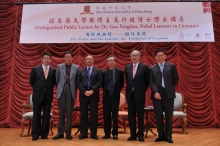
From left: Mr. Hardy Tsoi, Arts Administrator, CUHK Professor Leo Lee, Honorary Director, Professor of Humanities, Centre for East Asian Studies, CUHK Mr Christian Ramage, Deputy Consul General of France in Hong Kong and Macau Dr. Gao Xingjian, 2000 Nobel Laureate in Literature Professor Lawrence J. Lau, Vice-Chancellor, CUHK Professor Gilbert Fong, Professor, Department of Translation, CUHK
